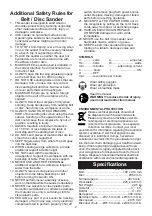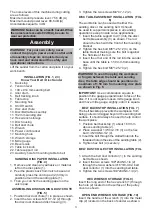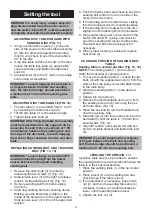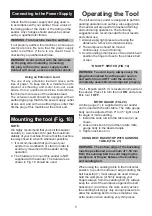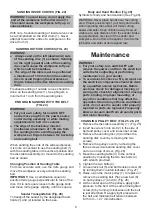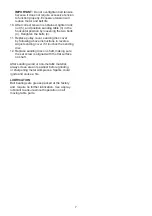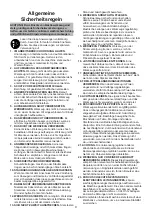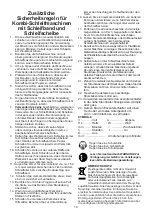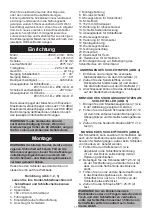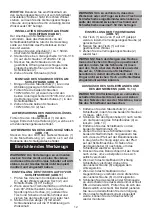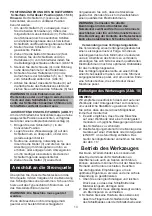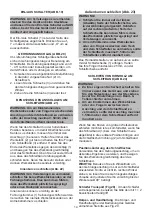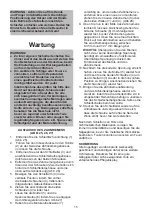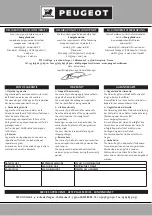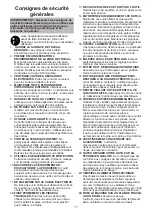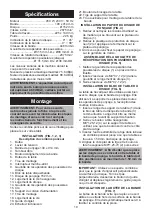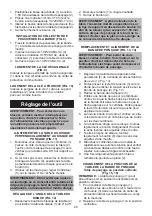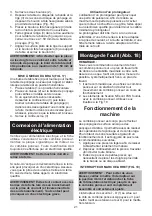
6
7
6
7
sanDing insiDe cUrves (fig. 22)
warning! to avoid injury, do not apply the
end of the workpiece to the idler drum (1).
This could cause the workpiece to fly up or
cause kickback.
With care, freehand sanding of inside curves can
be accomplished on the idler drum (1). Never
attempt to sand the ends of a workpiece on the
drive drum (1).
sanDing oUtsiDe cUrves (fig. 23)
Freehand sanding of outside curves should be
done on the sanding disc (1). Keep fingers a
minimum of 1 inch from the sanding disc.
enD grain sanDing with the belt
(fig. 24)
When sanding the ends of the wide workpieces,
it is more convenient to use the sanding belt (1)
with the sanding table in the vertical position and
the disc table assembly (2) moved to the sanding
belt as shown.
changing Position of sanding table
For more accurate work, use the mitre gauge and
move the workpiece evenly across the sanding
belt.
iMPortant:
Use a combination square to
position mitre gauge perpendicular to face of the
disc. If it is not square loosen mitre gauge knob
and move mitre gauge, slightly, until it is square.
sander transportation (fig. 28)
To transport the sander by the designated hand-
holds (1) and (2) located on the base.
warning!
●
always sand on the left (downward) side
of the sanding disc (1) as shown. sanding
on the right (upward) side of the sanding
disc could cause the workpiece to fly up
which could be hazardous.
●
the edge of the table must be positioned
a maximum of 1.59 mm from the sanding
disc to avoid trapping the workpiece or
fingers between the disc table and sanding
disc.
warning!
●
for your own safety, turn switch off
and remove plug from the power source
outlet during assembly or while making
adjustments to belt / disc sander.
●
the edge of the backstop must be
positioned a maximum of 1.59 mm from
the sanding belt to avoid trapping the
workpiece or fingers between the backstop
and sanding belt.
body and hand Position (fig. 29)
Symbols for body and hand position (See Fig.29).
Maintenance
changing PUlley belt (fig. 25, 26, 27)
1. Remove the disc table assembly (1). (Fig. 25)
2. Insert hex wrench into slot (2) in the side of
belt and pulley cover and loosen set screw.
3. Remove the sanding disc (3) and then the
sanding disc cover by removing the two
screws.
4. Remove the pulley cover by removing the
three screws (two behind sanding disc cover
and one on top of cover. (Fig. 26)
5. Move the sanding table (3) to the vertical
position by loosening the two hex bolts (4)
with wrench provided.
6. Tighten the two bolts (4).
7. Loosen lock nut (5) and belt tension screw (6)
by turning them counterclockwise. (Fig. 27)
8. Raise up on the motor pulley (7) to replace or
remove the existing belt. Place new belt (8)
on both pulleys (7) and (9). (Fig. 26)
9. At the center span of the pulleys, apply light
pressure to the belt. At the same time tighten
screw (6) by turning it clockwise until the belt
is just stretched. Re-apply light pressure to
the belt and maintain belt tension between
6.35 mm – 12.7 mm deflection.
warning!
●
for your safety, turn switch off and
remove the power cord from the electrical
outlet before adjusting or performing
maintenance on your sander.
●
To avoid electric shock or fire, all repairs to
the electrical components should be done
by a qualified service technician. Before
each use check for damaged, missing, or
worn parts; check for alignment of moving
parts, binding, improper mounting, or
any other conditions that may affect the
operation. should any of these conditions
exist, do not use the sander until properly
repaired or parts are replaced. frequently
blow or vacuum dust from all sander parts
and motor housing.
WARNING: Never place hands near the cutting
area. Proper positioning of your body and hands
when operating the sander will make cutting
easier and safer. Keep children away. Keep all
visitors at a safe distance from the sander. Make
sure bystanders are clear of the sander and
workpiece. Do not force the sander. It will do the
job better and safer at its designed rate.
Summary of Contents for ENERGYSand-100
Page 8: ...8 8 ...
Page 24: ...24 24 Sommaire GB P 1 7 D P 9 15 F P 17 23 The original instruction manual is in English ...
Page 29: ...29 29 Fig 27 Fig 25 Fig 26 4 3 9 4 8 7 6 5 2 3 1 2 1 Fig 28 Fig 29 ...
Page 30: ...GB Combiné ponceur bandes et disque ENERGYSand 100 MANUEL D UTILISATION ...


